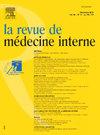How to avoid gifts from your patients after the Christmas holidays?
IF 0.7
4区 医学
Q3 MEDICINE, GENERAL & INTERNAL
引用次数: 0
Abstract
Background
Receiving gifts from patients could generate an ethical dilemma for physicians and refusing a present may be perceived as an offence.
Objective
To differentiate the particular physician characteristics that are associated with receiving gifts from outpatients. To propose a strategy to avoid gifts and thus ethical dilemma.
Design
A prospective and multicentric study in France during the month of January 2024.
Setting
Public hospitals, private hospitals and family practices across 20 cities in France.
Participants
Physicians from 21 medical and surgical specialities. Setting Public hospitals, private hospitals and family practices across 20 cities in France.
Interventions
Each physician completed a questionnaire that highlighted their habitual practices during consultations and recorded the gifts they received on a standardized gift calendar.
Main outcomes measures
Receiving at least one gift during January 2024.
Results
In total, 655 physicians were contacted before December 31st, 2023, 109 (16.6%) positively responded, of them 76 (70%) declared receiving at least one gift from patients. An experience > 10 years in the current job (P = 0.04), being the “Explorer” Myers Briggs Type Indicator (MBTI) personality type (P = 0.034), and a frequent delay of over 30 minutes at the end of the day of consultations (P = 0.048) were statistically associated with a higher likelihood of receiving at least one gift from patients in multivariate analysis. The physicians who received the most gifts per 100 consultations were those with over 10 years experience and those who fell under the MBTI personality role “Explorer”: 2.72 (IQR [1.56–7.55], P = 0.029) and 3.33 (IQR [2.16–6.43], P = 0.028), respectively.
Conclusion
After analysing the factors that increase the risk of receiving a gift from a patient, we have surmised the following advice for physicians who do not wish to find themselves in the midst of an ethical dilemma. They should avoid staying in the same service for more than 5 years, try to adopt the MBTI personality type “Analyst” and be on time in their consultations.
如何避免病人在圣诞节假期后送礼物?
背景:接受病人的礼物可能会给医生带来道德困境,拒绝接受礼物可能会被视为一种冒犯。目的:区分与接受门诊病人礼物有关的特殊医生特征。提出避免赠礼从而陷入伦理困境的策略。设计:2024年1月在法国进行的前瞻性多中心研究。环境:法国20个城市的公立医院、私立医院和家庭诊所。参与者:来自21个医学和外科专业的医生。在法国20个城市设立公立医院、私立医院和家庭诊所。干预措施:每位医生完成一份问卷,突出他们在咨询期间的习惯做法,并在标准化的礼物日历上记录他们收到的礼物。主要结果测量:在2024年1月期间至少收到一份礼物。结果:在2023年12月31日前,共联系了655名医生,其中109名(16.6%)积极回应,其中76名(70%)表示至少收到过一份患者的礼物。多变量分析显示,在职10年以上的经验(P=0.04)、“探索者”迈尔斯·布里格斯类型指标(MBTI)人格类型(P=0.034)以及在咨询结束时经常延迟30分钟以上(P=0.048)与从患者那里收到至少一份礼物的可能性较高相关。每100次问诊中收到礼物最多的是有10年以上工作经验的医生和MBTI人格角色“探索者”的医生:分别为2.72 (IQR [1.56-7.55], P=0.029)和3.33 (IQR [2.16-6.43], P=0.028)。结论:在分析了增加接受病人礼物风险的因素后,我们为那些不希望自己陷入道德困境的医生提供了以下建议。他们应避免在同一部门工作超过5年,尽量采用MBTI人格类型“分析师”,并按时进行咨询。
本文章由计算机程序翻译,如有差异,请以英文原文为准。
求助全文
约1分钟内获得全文
求助全文
来源期刊

Revue De Medecine Interne
医学-医学:内科
CiteScore
0.70
自引率
11.10%
发文量
526
审稿时长
37 days
期刊介绍:
Official journal of the SNFMI, La revue de medecine interne is indexed in the most prestigious databases. It is the most efficient French language journal available for internal medicine specialists who want to expand their knowledge and skills beyond their own discipline. It is also the main French language international medium for French research works. The journal publishes each month editorials, original articles, review articles, short communications, etc. These articles address the fundamental and innumerable facets of internal medicine, spanning all medical specialties. Manuscripts may be submitted in French or in English.
La revue de medecine interne also includes additional issues publishing the proceedings of the two annual French meetings of internal medicine (June and December), as well as thematic issues.
 求助内容:
求助内容: 应助结果提醒方式:
应助结果提醒方式:


